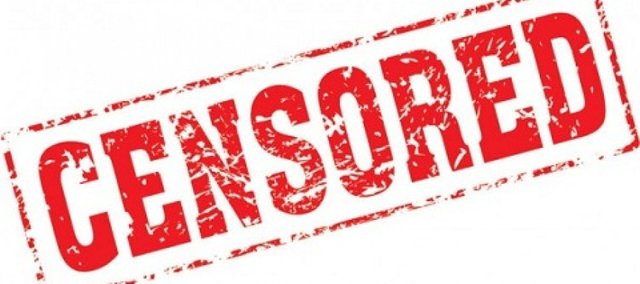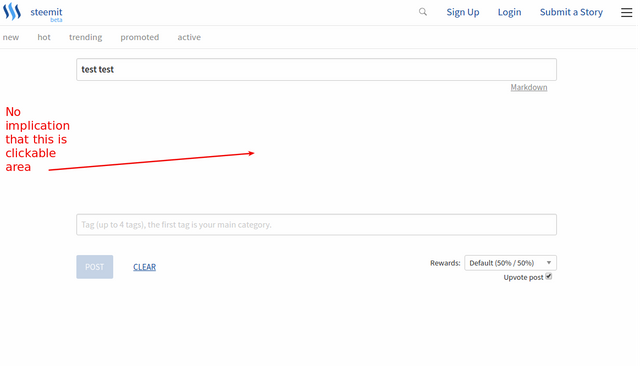Are Blockchains Really Censorship Resistant?
We live in a world full of censorship designed to prevent undesirable information from spreading among the masses. Through censorship truth is suppressed and the masses are denied the ability to organize. In the absence of truth, lies are propagated and these lies undermine the very basis of critical thinking, facts.
Censorship consists of more than just the right to speak unpopular opinions. It also includes the right to enter currency contracts and publish title transfers. All that is necessary for a free people to secure their property rights is to adopt a public database tracking who owns what. This database can be updated at anytime provided an individual is free to publish a valid signed transfer request. If you are denied the right to publish your transfer request, then you no longer have the ability to transfer your property. This ultimately means you no longer have the means to sell the property and therefore have had your property effectively seized.
Bitcoin is powerful because it prevents the banking system from seizing your account. This is made possible because all transactions are broadcast on a peer-to-peer network and there is no single entity that is able to prevent the transaction from being included in a block. In theory, if you really wanted to transact then you could mine your own block to include your transaction.
Are Transaction Fees a form of Censorship?
The Bitcoin blockchain is currently operating at peak capacity. Due to the law of supply and demand, block producers are now prioritizing transactions that pay the highest fee. As fees increase, those with small account balances are having their property stolen. If it costs more to transfer your Bitcoin than the bitcoin is worth, then you are out of luck.
Obviously no one really considers a $0.05 fee "theft" nor writes home about not being able to spend the $0.02 they earned on Steem due to Bitcoin transaction fees. The fact remains that Bitcoin miners are picking and choosing transactions based upon their own personal profit and that the result is that some users are denied the freedom of speech.
At what point does a transaction fee transition from a legitimate cost of consuming scarce resources to a illegitimate asset forfeiture? What if Bitcoin transactions cost $100 each? What if Bitcoin miners colluded to raise the price? What if the block size debate is a convenient cover for this collusion?
Other Forms of Fee Payment
Bitcoin miners are assumed to be rational economic actors in competition with each other. This means they will maximize their revenue by filling blocks with as many transactions as possible to collect the highest fee. If the fee is paid as a block reward, then all miners compete and the block difficult increases. Miners only really earn the mining profit margin on the transaction fee rather than the full fee.
Smart mining pools can increase their profits by selling transaction services. They can offer to include transactions at half-price if the individual is willing to subscribe to their service and is willing to wait 2 hours for confirmation. A mining pool with just 10% of the hash power could secure 10% of the daily Bitcoin transaction fees without increasing the difficulty. This means their profits will be much higher than other mining pools.
Eventually the major mining pools realize that they can collude to collect fees outside of the block rewards and do so without competing with each other on hash power. If market forces ever push Bitcoin in this direction then this new cartel will be in the same position that the big banks are today: a monopoly on Bitcoin transfers.
Crony Transfers
What if the miners didn't want fees, but instead wanted favors? What if only Bitcoin exchanges and other major players were allowed to transfer? What if people were denied access simply because they were facilitating competition to Bitcoin? The gatekeepers on the transaction ledger become the defacto regulators on what extra-consensus rules apply to transactions.
What happens if a Bitcoin side chain emerges that offers better services than the core blockchain? What happens if the majority of actual Bitcoin usage occurs on the side chain even if it only represents a minority of total bitcoin supply? What if this side chain starts eating into fee revenue of the miners?
Do Bitcoin miners interfere with transfers to and from the side chain? Could a side chain render the original Bitcoin network irrelevant? What would happen if one day people woke up and realized they no longer required the actual Bitcoin network to have decentralized, low cost, transfers secured on a blockchain? Do you see the problem?
Bitcoin miners have different incentives from Bitcoin holders and users. Miners want control over transactions so they can act as gatekeepers and collect rent. Users want cheap, fast, private, secure, stable currency.
The Trojan Horse
Those who operate the Bitcoin infrastructure have financial interest in seeing Bitcoin widely adopted. Until it is widely adopted Bitcoin is vulnerable to competition that offers better service and plays well with others. If Bitcoin maximalists get their way then one day Bitcoin will be as common as the U.S. dollar and have such broad network effect that people are locked in.
All modern currencies had their root in honest money that was held accountable by physical limits on the supply of gold and silver. It was only after they secured control over the transfer of gold and silver that they were able to abuse the privilege.
Back to Censorship Resistance
We have already established that all blockchains have block producers with the power to demand fees and censor transactions for personal profit. For a blockchain to resist censorship the block producers must be subject to popular approval. If the block producers are above popular approval then there is little recourse to their efforts at censorship.
Nothing in life is free, including speech. There is a real and measurable cost associated with publishing information. This cost is magnified when the channel has limited bandwidth and/or barriers to entry.
The question is not whether or not a blockchain is "censoring" transactions today, it is what recourse do the masses have if the block producing gatekeepers start censoring tomorrow. Once a currency has a certain momentum it is not as easy as getting everyone to switch to a new blockchain. Instead, people need a means of reaching consensus on new block producers.
Is Censorship Subject to Popular Opinion?
At this point we reach the crux of the matter. Ultimately popular opinion is what will censor us. The people will tend to focus on a few currencies and the only thing preventing the block producing gatekeepers from censoring is the willingness of the people to replace them. This means that gatekeepers can censor as much and as often as they like so long as popular opinion is on their side. There are many cases where the public will back censorship and the gatekeepers will have financial incentive to support them.
Ultimately, censorship resistance is nothing more than making it difficult for private interests to co-opt and operate public blockchain / broadcast infrastructure in a manner contrary to token-holder opinion. Proof of Work systems are designed with a built-in conflict of interest and barrier to entry. Only democratic proof of stake systems, like DPOS, are able to give the token holding public some say over who produces blocks and therefore what is or is not censored. This is the best possible technological solution to censorship protection.
Ultimately, freedom of speech and property rights are subject to our culture and our technology will merely reflect that culture.

I've felt like I've been in a minority in libertarian/anarchist circles when I've stated that "absolute free speech" is not a goal, nor a right.
Government should not restrict the distribution of ideas, and when it does, it's usually done to block information that is harmful to the rulers. So, it's necessarily a negative when government decides to restrict the distribution of information. This is why government enforced restrictions of speech are to be opposed.
However, even anarchists seem to have a problem grasping the idea voluntary societies and platforms make their own rules.
If Dan were to create a new social media right now that had "No Backstreet Boys posts" as a term of joining, I'd be in breach of contract if I were to post about Backstreet Boys and it'd be within Dan's rights to kick me out.
Just like I would kick Dan out of my living room if he were to come in there to insult me.
So, even if the blockchain could enforce this form of censorship brought up in the post, I wouldn't see it as a big threat, or as a reason to abandon the blockchain. At least not the potential of it. Of course, if rules on information distribution were enforced that I personally would not agree with, then I would reevaluate.
But I'm sure competition would then create a better blockchain.
So, as long as rulers who were not chosen by me voluntarily can not enforce restrictions on the blockchain, I'm not worried as of yet.
I hope I made sense.
Yes, but the key problem outlined in the article is two part. Whether the gatekeepers (miners) can monopolize supply and demand. As you point out, one enters the "game" with known rules. However, part two is when those said rules become unfair. Simply moving over to another blockchain/coin circumvents this, BUT, as pointed out, there is inertia against this, out of human habit, laziness, but most importantly, entrenched investment (time, effort, systems).
This is the very reason why everybody hasn't quick as a flash jumped ship on the current global financial system and embraced blockchain.
It is this delay in adoption, which allows an establishment to implement actions (laws, trade sanctions, physical enforcement, war) to retain the status quo.
Example: fossil fuel vs renewables. We have lived in a petrochemical dark age for the past century.
When it is a matter of blog posts and comments then you are 100% in line. When it comes to censoring financial transactions in a system that is widely adopted as money (hence near monopoly) then people need to be wary about the power that gives gatekeepers (even in a voluntary society).
This always remains a technical possibility, but it might not always be a practical one. I think of it like this: network effects are anti-competitive. If bitcoin were as widely-used as the US Dollar, many of its users would be effectively locked in to it and it could take a very large fraud/coercion/censorship problem to actually drive people to a new blockchain.
I'm just saying: competition may not always be quite the solution that many libertarians think it is.
This was my first post created with the new medium-style editor at https://test.steemit.com/
I must say that I found the process to be much nicer than raw markdown and/or all prior editors we have had. Give it a try and let us know what issues you have!
Feedback about new medium-style editor:
I really had not clue what happen to post textarea when I switched editor. There should be some kind of border around this area or at least placeholder message inside

Problems with menu with smaller screensize
Still no possibility of uploading image directly?
Of course we do not want to store images in blockchain right now (because of disk space reasons), so it would have to be stored on Steemit's servers, but new users very often do not know how to upload images to steemit with 3rd party services.
Avarage Joe do not know services like http://imgsafe.org/ or https://ipfs.pics/ and do not know how to use them. Steemit has to be more user-friendly.
Soon.
This is the best comment I have read in a while. So excited to have this feature. I have recruited 7 friends/family to the site so far and adding pictures has been a major hurdle for them. Second to backing up their login correctly, but that I do not mind.
what if... steemit would provide a QR-like code for exporting keys/password?
Then user could use smartphone to export (or backup) key and at the same time, it would be very easy for applications like eSteem to import those keeys:
Password/Private key:

Public Key:

In the end it would still come down to their backup method and the level of security on their part.
In Litecoin its 2 weeks :))))))
what about instant messaging, is that going to be a feature on Steemit at any time in the future? i think this will really help with user friendliness, if it's done right.
It is something I want as well and something that will eventually show up. It is just low on the priority list at the moment.
OK. Thank you.
You forgot to mention steemimg.com :-)
just had a look at it. If I click to add a video the pop-up shows up and I can paste the link to YouTube and Vimeo. All good there but if I did click it by accident and don't want to add a video, it would be nice to be able to press Esc to remove it (a la Medium). Atm I need to click outside of the link paste box and delete the section manually.
The text selection and formatting seems to be working OK. When should we expect this feature to be rolled out to the main interface?
Thanks a lot for developing this!
It looks nice, but for people like me who are not on medium, it was hard to figure out how it was working. I have also seen some posts with columns and embedded figure (within the next). Would it be possible to add such a feature? Thanks in advance!
Bitcoin - Where to begin...?It takes a lot of proprietary hardware and enormous amounts of electricity from the power-plants in order to create bitcoins. Obviously it is big business for the hardware-industry and the electricity-markets.
Bitcoin - The suppliers who benefitThe owners of the electricity-markets burn a lot of Coal, Oil and Liquid Natural Gas in order to deliver power to the miners so they can get these tokens - that is for sure.
Bitcoin - An Expensive FactoryMiners need proprietary hardware to keep up with their competitors, which created the ASIC-Market which has grown into this size:
A Mining-Rig now a days are two shipping-containers in size, for simplicity and cost-effectiveness - try run this monster on solar-panels :) And what I personally think is that at some point everyone will find it meaningless to keep competing like this, because once they have shipped enough containers - the diff goes up and everyone has to upgrade to something bigger and better again to not lose a block.
Bitcoin - It is Chinas World CurrencyMostly everyone else has given up or gone bankrupt except China when it comes to mining-farms/companies/factories or whatever we want to call them.
So what are we talking about really? "90 companies located close to one another" just to say a number - and these companies know about each other and have meetings/gatherings with third parties like Google/Alphabet behind closed doors etc...
Yes - Bitcoin started with great intentions, but where is it headed?
Random Comment: @dantheman @ned - when looking at ones blog it would be better to separate the # of posts made from # of comments. Take a look at my blog, it says 200 something posts. I think it would be better to have it separate. If each had a separate counter blog posts/comments. End of day up to yall but just my opinion.
Wow! This is something I never had thought about. I'll have to ponder on this. I thought that most miners were big Bitcoin holders but even if this is so the possible problems you're pointing out still remains.
I will try it out for my next post, thanks for all that you do @dantheman.
MMmmm I wonder what monolithic company could create a sidechain better than the core blockchain?
Vielen Dank für diesen Interessanten Post. Es bleibt spannend!
Thanks for this interesting post. It remains exciting!
We all know that STEEM is light, fast, and free, so maybe we should not try to push ideas so heavy... Gravity will ensure that STEEM rises. Relax and enjoy the ride...
the current lack of power balance of Steem does not make it the ideal censorship free place but with time, when that evens out, it has chances given that it's light, fast and free, as you say.
This was a great article BM, another well reasoned comparison of DPoS and PoW. I hope every crypto enthusiast or newbie to blochchain text reads this.
I'm also glad you framed the correct causal agent that shapes the nature of censorship, that being culture. It's impossible to get rid censorship entirely as long as humans are in the loop.
I am writing this reply on the test.steemit.com as you suggested in your comment, but so far I see no differences at all. I just confirmed to myself that test.steemit uses the same chain as steemit.com.
What must I do to see the new editor, assuming the default is the old one? I didn't see anything under settings for editor preference, so how can one "give it a try" ? How is this new "medium-style" editor chosen?
From what I see, new editor is enabled only for posts. For comments by default there is support for markdown enabled
OK, nice to know. Thanks for the info @noisy!
I just posted a fresh article using test.steemit.com and saw no differences at all, just like the comments on steemit.com. I also used the same formatting techniques and they continue to work.
Are the differences on the new editor obvious, if so they must be turned off now.
by default, markdown editor is enabled, as I mentioned here